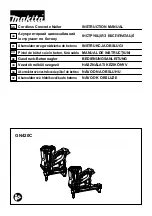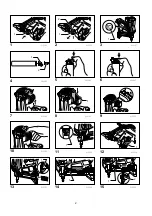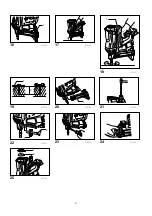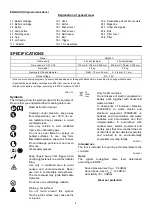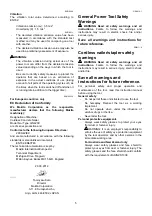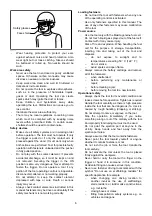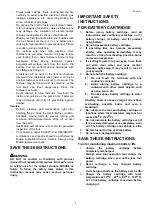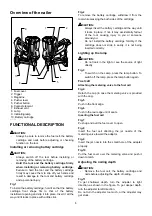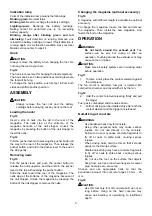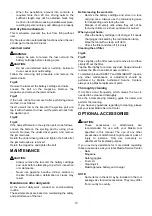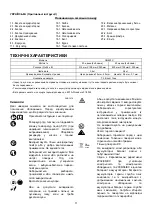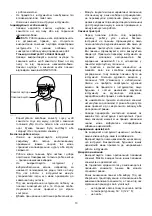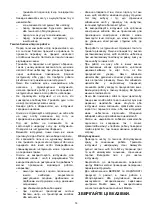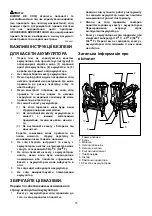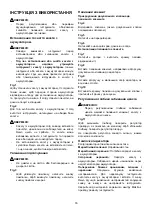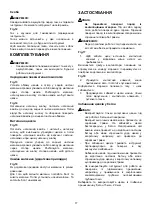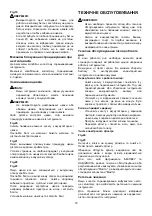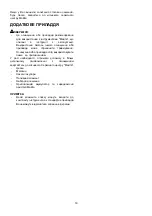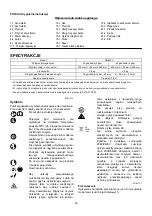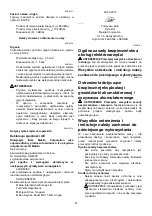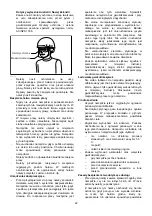
7
•
Check walls, ceilings, floors, roofing and the like
carefully to avoid possible electrical shock, gas
leakage, explosions, etc. caused by striking live
wires, conduits or gas pipes.
•
Do not use the tool for fastening electrical cables.
It is not designed for electric cable installation and
may damage the insulation of electric cables
thereby causing electric shock or fire hazards.
•
Watch your footing and maintain your balance with
the tool. Make sure there is no one below when
working in high locations to prevent danger if there
is sudden jerking or catching.
•
On rooftops and other high locations, drive
fasteners as you move forward. It is easy to lose
your footing if you drive fasteners while inching
backward. When driving fasteners against
perpendicular surface, work from the top to the
bottom. You can perform driving operations with
less fatigue by doing so.
•
A fastener will be bent or the tool can become
jammed if you mistakenly drive fastener on top of
another fastener or strike a knot in the wood. The
fastener may be thrown and hit someone, or the
tool itself can react dangerously. Place the
fasteners with care.
•
Never attempt to drive fasteners from both the
inside and outside at the same time. Fasteners
may rip through and/or fly off, presenting a grave
danger.
Service
•
Perform cleaning and maintenance right after
finishing the job. Keep the tool in tip-top condition.
Lubricate moving parts to prevent rusting and
minimize friction-related wear. Wipe off all dust
from the parts.
•
Ask Makita authorized service center for periodical
inspection of the tool.
•
To maintain product SAFETY and RELIABILITY,
maintenance and repairs should be performed by
Makita Authorized Service Centers, always using
Makita replacement parts.
SAVE THESE INSTRUCTIONS.
WARNING:
DO NOT let comfort or familiarity with product
(gained from repeated use) replace strict adherence
to safety rules for the subject product. MISUSE or
failure to follow the safety rules stated in this
instruction manual may cause serious personal
injury.
ENC009-1
IMPORTANT SAFETY
INSTRUCTIONS
FOR BATTERY CARTRIDGE
1.
Before using battery cartridge, read all
instructions and cautionary markings on (1)
battery charger, (2) battery, and (3) product
using battery.
2.
Do not disassemble battery cartridge.
3.
If operating time has become excessively
shorter, stop operating immediately. It may
result in a risk of overheating, possible burns
and even an explosion.
4.
If electrolyte gets into your eyes, rinse them
out with clear water and seek medical
attention right away. It may result in loss of
your eyesight.
5.
Do not short the battery cartridge:
(1)
Do not touch the terminals with any
conductive material.
(2)
Avoid storing battery cartridge in a
container with other metal objects such
as nails, coins, etc.
(3)
Do not expose battery cartridge to water
or rain.
A battery short can cause a large current flow,
overheating, possible burns and even a
breakdown.
6.
Do not store the tool and battery cartridge in
locations where the temperature may reach or
exceed 50
゚
C (122
゚
F).
7.
Do not incinerate the battery cartridge even if
it is severely damaged or is completely worn
out. The battery cartridge can explode in a fire.
8.
Be careful not to drop or strike battery.
9.
Do not use a damaged battery.
SAVE THESE INSTRUCTIONS.
Tips for maintaining maximum battery life
1.
Charge the battery cartridge before
completely discharged.
Always stop tool operation and charge the
battery cartridge when you notice less tool
power.
2.
Never recharge a fully charged battery
cartridge.
Overcharging shortens the battery service life.
3.
Charge the battery cartridge with room
temperature at 10
゚
C - 40
゚
C (50
゚
F - 104
゚
F).
Let a hot battery cartridge cool down before
charging it.
Summary of Contents for GN420CLSE
Page 69: ...69 ...
Page 70: ...70 ...
Page 71: ...71 ...
Page 72: ...72 Makita Corporation Anjo Aichi Japan www makita com 885157 979 ...

